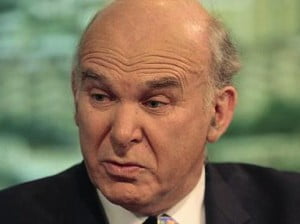Maria Miller, corruption and the gospel
 After a calendar week of pressure and mounting headlines, Maria Miller has resigned her postal service equally Culture Secretary. At that place has been some speculation that force per unit area mounted on her from the press considering of opposition to the government'southward program to restrict the printing and make them more accountable, or from traditional Conservatives because she had been the person charged with steering through the legislation on Same-sexual activity Matrimony. Merely I think there is a more straightforward and profound reason behind the force per unit area: to virtually ordinary voters, the whole episode looked like corruption.
After a calendar week of pressure and mounting headlines, Maria Miller has resigned her postal service equally Culture Secretary. At that place has been some speculation that force per unit area mounted on her from the press considering of opposition to the government'southward program to restrict the printing and make them more accountable, or from traditional Conservatives because she had been the person charged with steering through the legislation on Same-sexual activity Matrimony. Merely I think there is a more straightforward and profound reason behind the force per unit area: to virtually ordinary voters, the whole episode looked like corruption.
This is my understanding of what had happened:
- Maria Miller claimed for total expenses for a second habitation, bought in Wimbledon, nether the regulations that were in place upward to 2010.
- She claimed mortgage interest and expenses of £90,718 over a iv-year period in relation to the 2nd home, merely this was where her parents and children lived. So the Daily Telegraph reported in Dec 2012 that this was in breach of the 'second home' rules in force at the time, as well as of course now being disallowed by the new regulations. It looked very much like the kind of 'swapping' arrangement which had previously been criticised.
- She has likewise failed to reduce her claim when mortgage involvement rates came down—in other words, she claimed for costs that she had not actually paid.
- The parliamentary Commissioner for standards, Kathryn Hudson, investigated, but only after a complaint by Labour MP John Isle of mann. She cleared Miller of making a faux claim, but did recommend she repaid £45,000 that she had in fact overclaimed under the rules in forcefulness at the time.
- Even so, the Eatables Committee for Standards, comprising 10 voting MPs and 3 non-voting lay members, did not accept the recommendation, and required that she only repay £4,500. Just they likewise said she should apologise considering of her mental attitude to the Commissioner'south investigation. It was said that she had made threatening comments to the Commissioner, and a phone telephone call has emerged where she also fabricated threats about regulation to newspapers interested in the story.
- Her apology in the Commons was a terse 32 seconds, and her concluding resignation letter made no reference to any incorrect-doing or compromise.
- I sympathize that she has made around £1 million from the increase in the value of the holding—though but office of this was during the time when her mortgage payments were being funded by Parliamentary expenses.
There were two contrasting reflections on Radio 4'south 'Today' programme this morning. Michael Gove, Education Secretary, made no acknowledgement that anything wrong had happened, and commented that she was a practiced and hard-working MP and minister, who had juggled work with beingness a mother (which raises a whole other range of problems). And her departure now leaves only three women (out of 22) in the Chiffonier. But someone from the constituency party offer quite a dissimilar perspective: what had happened looked did not await moral to the 'man on the street' (sic).
From observing newspaper reports and discussions on Facebook, this disparity touches on the center of the matter. To near ordinary people, the whole sequence of events seems incredible, and nada short of institutional abuse. It seems extraordinary that someone should 'overclaim' by £45,000, for this overclaim to exist acknowledged, but it be ruled that at that place was no wrongdoing, and in fact the need to repay the overclaim be then ignored by peers. If this happened in any normal workplace, it seems to almost people that the offender would be sacked from his or her job at the very to the lowest degree, and quite perhaps prosecuted. How is it that such different standards are applied in Parliament? And how is information technology that, subsequently all the expenses scandals, MPs are still, in effect, regulating each other on this? I think information technology accept about 45 minutes to get to the House of Eatables from Wimbledon, and about an hour past railroad train from Basingstoke, Miller'south constituency. So all this was near saving 15 minutes in her journey to piece of work! The Authorities appears to have little understanding that, fifty-fifty if the rules have been followed, this looks immoral to many voters.
 Here is some other contempo example. Vince Cable, the Secretary of Land for Business organisation, agreed the auction of the Post Function for what is generally reckoned to be £2 billion less than its proper market value. He did this on advice from seven banks, all of whom and so had preferential options to buy shares equally corporate investors. There was a 'gentleman's understanding' that these banks would not immediately sell their shares, but at to the lowest degree 50% of these shares were immediately sold to take the profit. One of the hedge funds that did purchase had immediately made £36 million profit; its director is one Peter Davies, who happens to have been George Osborne's best man after getting to know him at Oxford University.
Here is some other contempo example. Vince Cable, the Secretary of Land for Business organisation, agreed the auction of the Post Function for what is generally reckoned to be £2 billion less than its proper market value. He did this on advice from seven banks, all of whom and so had preferential options to buy shares equally corporate investors. There was a 'gentleman's understanding' that these banks would not immediately sell their shares, but at to the lowest degree 50% of these shares were immediately sold to take the profit. One of the hedge funds that did purchase had immediately made £36 million profit; its director is one Peter Davies, who happens to have been George Osborne's best man after getting to know him at Oxford University.
Information technology seems to me that there is only i expression to describe this kind of affair: utterly corrupt. And these two examples keep to alienate the 'political grade' from voters, threatening to increase the loss of confidence in political processes, and farther reduce active involvement in political parties. You would think that politicians might have learning something from the experience of contempo years.
But why should I be interested in this every bit an ordained Christian government minister? Well, I am interested in politics and public life mostly, and it is e'er very satisfying to be able to vent my own frustrations and express my opinions. But, it might be asked, shouldn't Christian leaders be talking about Jesus more, rather than getting embroiled in political debates? I recently saw this equally a criticism of Justin Welby's Twitter feed: why the constant give-and-take almost social issues, rather than spiritual? The church is not the religious arm of the Labour party; the kingdom of God will not come through political or social reform. Then why write virtually this? For me, there are at least six reasons:
1. Early on in my Christian life (through CYFA camps as a teenager), I was inducted into a both/and approach to issues of faith and order. To exist a disciple in the modernistic world involves understanding that world and how the good news about Jesus engages with it. I have explored this elsewhere, drawing on some helpful observations from Jon Kuhrt.
two. Out of this, I have always felt it is vital not to divorce the social from the spiritual. What nosotros believe well-nigh God must accept an bear on on what we believe about those around us and our relations with i some other. This is the extended theme of, for example, the letter from James; Paul, passionately concerned to brand the gospel known, was as well committed to remembering the poor equally an integral part of his message.
three. Throughout the Sometime Testament, God is interested in issue of social justice and integrity, non only personal morality. Jesus in Luke 4 proclaims his ministry every bit including 'proclaiming good news to the poor', and though this is configured in the NT in a different way, 'justice' continues to exist a key function of what we understand as God's 'righteousness.' God's call on Christians is to go along to speak truth to power.
4. It is a vital part of Christian ministry to exist concerned with what happens of about people Monday to Friday, and not just on Sunday. This includes speaking out about and encouraging a business organisation for integrity for Christians in their workplaces.
5. For other reasons, I accept recently exist spending a bit of time in Romans 1–iii. It has been fascinating to exist immersed in Paul's extended reflection on the reality of the human condition. In politics, as in other contexts, we tin encounter very clearly that power corrupts, and this testifies to the frailty of the homo condition: we are corruptible. This is not simply to say that Christians are better than others, merely that we share a common, fallible humanity—and because of this are all in need of God's forgiveness, liberation and empowering.
half-dozen. Christians demand to be speaking out on these issues if we are to retain apologetic credibility. Information technology has sometimes been said that 'The church building is the just organisation which exists for the sake of these who are not members.' I really think this is something of a half truth—simply a church building which only goes on near mission can hands look like a move that is interested only in its own calendar. The kingdom of God is really most a radical business concern for others, for their ain sake, which ways getting involved in these kinds of discussions.
Declaration of truth and integrity, and proclamation of the good news of God in Jesus, demand to become manus in mitt.
If you enjoyed this, do share it on social media (Facebook or Twitter) using the buttons on the left. Follow me on Twitter @psephizo. Like my page on Facebook.
Much of my work is washed on a freelance ground. If y'all have valued this post, you can make a single or repeat donation through PayPal:
Comments policy: Good comments that appoint with the content of the post, and share in respectful fence, tin can add existent value. Seek first to sympathise, and so to exist understood. Make the most charitable construal of the views of others and seek to larn from their perspectives. Don't view debate as a conflict to win; accost the argument rather than tackling the person.
hamiltonviscruend.blogspot.com
Source: https://www.psephizo.com/life-ministry/maria-miller-corruption-and-the-gospel/
ارسال یک نظر for "Maria Miller, corruption and the gospel"